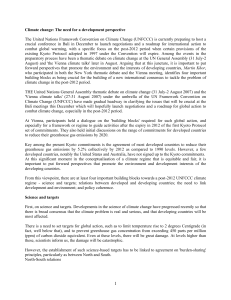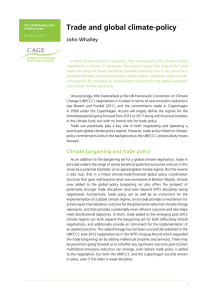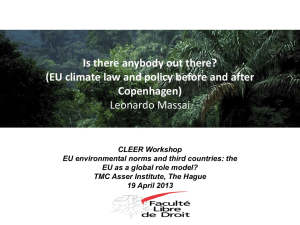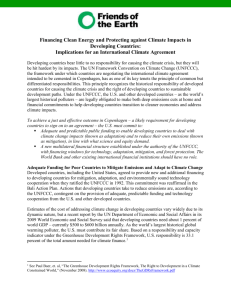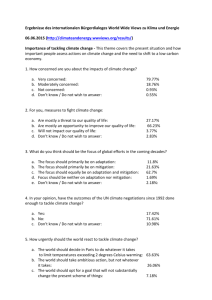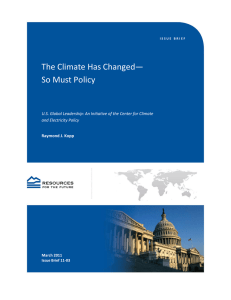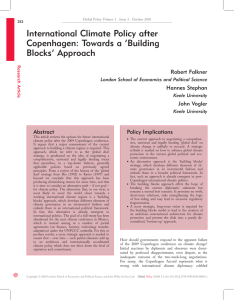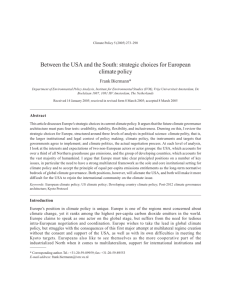Developing countries state views at General Assembly climate debate
advertisement
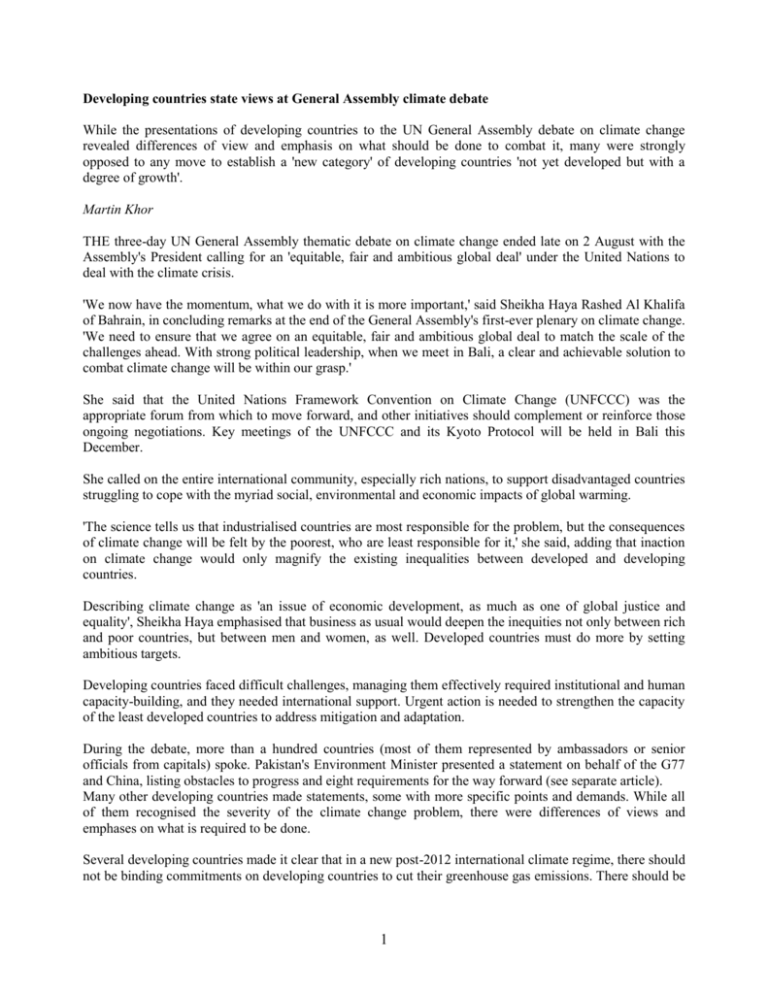
Developing countries state views at General Assembly climate debate While the presentations of developing countries to the UN General Assembly debate on climate change revealed differences of view and emphasis on what should be done to combat it, many were strongly opposed to any move to establish a 'new category' of developing countries 'not yet developed but with a degree of growth'. Martin Khor THE three-day UN General Assembly thematic debate on climate change ended late on 2 August with the Assembly's President calling for an 'equitable, fair and ambitious global deal' under the United Nations to deal with the climate crisis. 'We now have the momentum, what we do with it is more important,' said Sheikha Haya Rashed Al Khalifa of Bahrain, in concluding remarks at the end of the General Assembly's first-ever plenary on climate change. 'We need to ensure that we agree on an equitable, fair and ambitious global deal to match the scale of the challenges ahead. With strong political leadership, when we meet in Bali, a clear and achievable solution to combat climate change will be within our grasp.' She said that the United Nations Framework Convention on Climate Change (UNFCCC) was the appropriate forum from which to move forward, and other initiatives should complement or reinforce those ongoing negotiations. Key meetings of the UNFCCC and its Kyoto Protocol will be held in Bali this December. She called on the entire international community, especially rich nations, to support disadvantaged countries struggling to cope with the myriad social, environmental and economic impacts of global warming. 'The science tells us that industrialised countries are most responsible for the problem, but the consequences of climate change will be felt by the poorest, who are least responsible for it,' she said, adding that inaction on climate change would only magnify the existing inequalities between developed and developing countries. Describing climate change as 'an issue of economic development, as much as one of global justice and equality', Sheikha Haya emphasised that business as usual would deepen the inequities not only between rich and poor countries, but between men and women, as well. Developed countries must do more by setting ambitious targets. Developing countries faced difficult challenges, managing them effectively required institutional and human capacity-building, and they needed international support. Urgent action is needed to strengthen the capacity of the least developed countries to address mitigation and adaptation. During the debate, more than a hundred countries (most of them represented by ambassadors or senior officials from capitals) spoke. Pakistan's Environment Minister presented a statement on behalf of the G77 and China, listing obstacles to progress and eight requirements for the way forward (see separate article). Many other developing countries made statements, some with more specific points and demands. While all of them recognised the severity of the climate change problem, there were differences of views and emphases on what is required to be done. Several developing countries made it clear that in a new post-2012 international climate regime, there should not be binding commitments on developing countries to cut their greenhouse gas emissions. There should be 1 adequate commitments from developed countries to cut their emissions, and provide adequate financial resources and technology transfer to developing countries. However, some developing countries, especially from small island states, made statements that implied that developing countries that are significant emitters should also make reduction commitments. There were also important differences in nuance and emphasis among developed countries that spoke, with European countries making specific commitments on emission reductions by 2020 and 2050, and firmly supporting the UN as the forum for negotiating a new post-2012 agreement (see separate article on developed countries' views). New category of developing countries? At the beginning of the second day's debate on 1 August, a special climate change envoy of the UN Secretary-General, former Chilean President, Ricardo Lagos, surprised the meeting by posing the question of whether a new category of developing countries should be established in the context of negotiating a post2012 climate regime. Reporting on his discussions with leaders of various countries, he said: 'I asked is it possible to have a new agreement that is more sophisticated ten years on, with a new category of countries, not yet developed but with a degree of growth, is it possible to make a category based on per capita income, different from lowincome countries.' Several delegates, speaking privately, said they wondered whether Lagos was expressing his own personal views, and whether it was appropriate to put forward this controversial question, since he was acting as special envoy of the Secretary-General. Many developing countries are opposed to a 'new category' of developing countries being referred to, let alone being established, as they see this as linked to demands that some developing countries be required to undertake binding commitments, including for emissions reduction. In the Kyoto Protocol, only developed countries (listed in Annex I) are required to undertake reduction commitments. In a hard-hitting statement, India's Ambassador Nirupam Sen said that action on climate change has to be based on science and not treating it as a post-modernist religion. A precautionary approach can be taken in the absence of scientific certainty but environmental concerns should not become additional conditionalities on growth in developing countries. As the Rio Declaration recognised, standards set in one society can have adverse impacts if applied in countries at different development levels. India then spoke on the issue of 'large emitters', a classification that it said does not exist in the UNFCCC or any other UN agreement, yet appears surprisingly in several recent UN documents. The developed countries have externalised the problem (effects of pollution) onto the developing world and also wish to externalise the cost of the solution. The greenhouse gas concentration is due to developed countries' emissions and Annex I countries will continue to contribute more to emissions in future also. Strict equity would mean that till excessive amounts of gasses have been soaked up, the developed countries ought to be held down to less than a per capita equal share. Major polluters certainly do not include developing countries like India with small carbon footprints in per capita terms, said Ambassador Sen. India's greenhouse gas emissions of 1 ton per annum are a quarter of the global average of 4 tons, and 4% of the US', 12% of the EU's and 15% of Japan's. 2 India proposed principles for realistic next steps. It said that 'the time is not ripe for developing countries to take quantitative targets as these could be counter-productive for their development processes.' The burden-sharing must be fair, taking account where the primary responsibility rests; no strategy should foreclose development possibilities of developing countries, and stabilisation goals and targets should be made at the UNFCCC. India said that the developed countries should take on substantially larger emission reduction targets than the 5.2% in Kyoto I and complete the negotiations on this by 2008/9. Adaptation needs to be resourced without diverting funds meant for development. The resources for adaptation should be of a similar magnitude as for mitigation and it should realise resources from the entire carbon market. Clean technology should be made affordable for developing countries, and the intellectual property regime should balance rewards for innovators with the common good of humankind. There should be collaborative R&D between developed and developing countries. The Clean Development Mechanism (CDM) should be expanded to include programmatic approaches. Biggest victim China's Ambassador Liu Zhenmin said that China would be the biggest victim of climate change, given its large population and low per capita income. The 'luxury emissions' of rich countries should be restricted while the 'emissions of subsistence' and 'development emissions' of poor countries should be accommodated. The principles of common but differentiated responsibilities (CDR) and of equity form the basis of international cooperation. Efforts to address climate change should be conducive to sustainable development. Technology is decisive to mitigation and adaptation, and there should be cooperation in R&D for new technologies but also in disseminating and using existing technologies, making them affordable and accessible to developing countries. 'Developed countries need to adopt policies that rise above short-sighted and narrow business interest, support early implementation of UNFCCC technology transfer provisions and develop effective technology transfer and cooperation mechanisms.' Ambassador Liu elaborated on China's measures to tackle climate change, including reducing energy intensity by 47% between 1990 and 2005, accounting for an accumulated emission reduction of 1.8 billion tons of carbon dioxide. China's per capita CO2 emissions are still low, or less than one-third the average level of developed countries. There are 42 million poor people in China and to improve the living standards of its 1.3 billion people, China's 'development emissions' may inevitably increase. As a major manufacturer, China's products are enjoyed across the world but China itself bears the mounting pressure of 'transferred emissions'. These two factors must be taken into account when focusing on China's emissions, said Ambassador Liu. Brazil's Director General for Environment in the Foreign Ministry, Luis Machado, said that contrary to what other speakers said, there is no expiry date for the Kyoto Protocol and Brazil considers the protocol as a cornerstone of the international climate change regime. He called for equity and fairness in the regime and in the distribution of responsibilities. This distribution lies on two fundamental facts - the historical responsibilities of developed countries, and the greater vulnerability of developing countries. These two elements are at the core of the CDR principle. However, this principle does not exempt any party from its responsibilities. 3 Said Brazil: 'In this global effort, binding quantitative reduction commitments by Annex I countries should continue and should be deeper in the second commitment period. Developing countries would not be expected to take on such commitments now, but there should be incentives for them to take measurable and reportable actions for reducing emissions, suited to their national needs and circumstances.' It added that this was why Brazil in 2006 (at the 12th Conference of the Parties to the UNFCCC) presented a proposal to create financial incentives to support national efforts to reduce emissions caused by deforestation. This idea can be expanded to other sectors, providing finance and technology to support actions by developing countries. It hoped that Bali would set clear time-tables and processes to conclude negotiations by 2009. Ambassador Francis Butagira of Uganda, on behalf of the Africa Group, elaborated on how Africa is most at risk from global warming, with threats to livelihoods, health and food security, including a decline in crop productivity by 50% by 2020. The Group called on developed countries to fulfil their mitigation commitments, transfer climate-friendly technology to developing countries, and provide finance and capacity building to Africa. The CDR principle must be upheld. On process, the Africa Group said that the UNFCCC and Kyoto Protocol are the key instruments to address climate change, based on sustainable development principles. 'Attempts to encroach on this mandate through over-emphasised linkages with security, good governance, humanitarian or similarly politicised connotations are not the proper course of action,' warned the Group. Grenada's Ambassador Angus Friday, on behalf of the Alliance of Small Island States (AOSIS), said that climate change is the single most important threat to development, security and the territorial existence of small island states, which have been the 'unwitting food tasters in a royal court that is being slowly poisoned by climate change.' A 1-degree rise alone in temperature presents critical dangers to small island states. For example, it will lead to significant loss of tuna and dolphin stocks for many states. Over the years, AOSIS had said that the devastating impact of climate change is already being felt by small island states where environmental refugees are being moved from their homes because of sea level rise, and houses, coral reefs, fish stocks and tourism are all affected. The expressions of goodwill at conferences on this topic have not been translated into programmes on the ground. On mitigation, it was very disappointed by the decline in public funding for R&D into renewable energy and clean technologies and asked for a reversal. On adaptation, AOSIS called for immediate operationalising of the new adaptation fund under the Kyoto Protocol. Extreme vulnerability Belize, speaking for the Caribbean Community (CARICOM), stressed the extreme vulnerability of the region to climate change. The region's priorities for a post-2012 regime are substantial and legally binding emission reductions in the shortest time frame possible, and significant increases in resources for adaptation for developing countries, especially small island and low-lying coastal developing countries. It urged all Annex I countries and the major emerging industrialised developing countries to agree to an aggressive mitigation regime for post-2012 aimed at achieving a less-than-2-degree temperature rise. Saudi Arabia said that developing countries that are energy exporters are in a unique situation where they are negatively impacted by climate change and also by the response measures designed to address it. It asked for caution to assure that mitigation actions do not create market distortions leading to unstable energy supplies that would in turn disrupt the development process. 4 It was surprised by references by others to the 'new climate change regime' and the meaning it implies, as there is already a 17-year-old regime. It referred rather to building a new level on the existing framework convention and the Kyoto Protocol, which should continue with the same objective, principles and foundations. It added that deeper emission cuts will have an adverse effect on fossil fuel energy exporting countries, and the adverse impact will spill over to all energy users. There is thus an obligation to carefully design measures that minimise the impact. Highlighting the climate change challenge for Africa, Namibia's Ambassador Kaire Mbuende said that more than 70% of the continent's people were dependent on subsistence agriculture. Agriculture, however, was threatened by frequent droughts and floods. Africa might lose $25 billion in crop failure due to rising temperatures, and another $4 billion from declining rainfall. Thus, the basis of existence for a large number of people was threatened. Senegal's representative drew attention to his region's weather disturbances, which had affected water systems and caused droughts and desertification. They had impacted the groundwater level and the quality of the soil. In the rainy season, floods had destabilised harvesting cycles. The most striking manifestation of climate change could be seen in the completely altered coastline, which affected the entire region and hampered economic development. Parts of the land were below sea level and were only protected by sand dunes, and building infrastructure to protect coastal areas would require extra financing. Cuba's Ambassador, Ileana Mordoche, stressed the central role that the General Assembly should play in the global debate on climate change, as the issue demanded both a comprehensive political outlook and a global assessment in a specialised body. The Security Council, which had debated the issue a few months ago, was an organ with a limited membership. It was neither representative nor very transparent and did not have the mandate or the necessary expertise to properly address the matter. This article first appeared in the South-North Development Monitor (SUNS, No. 6307, 6 August 2007). 5
